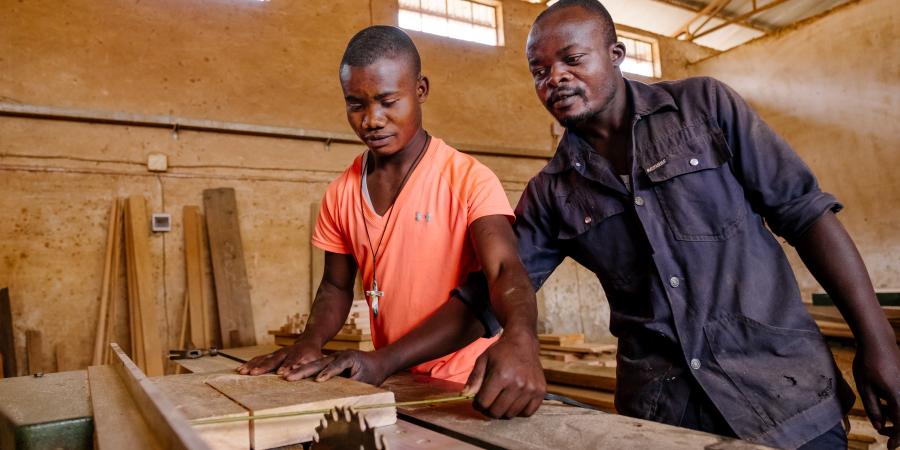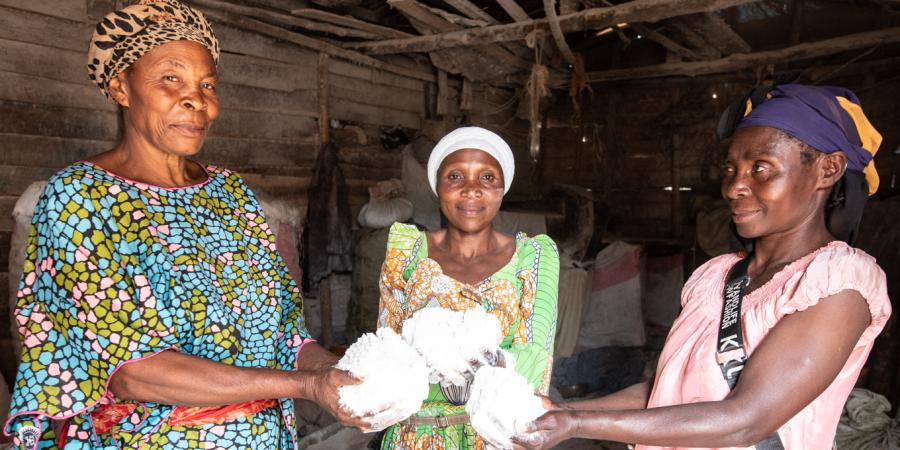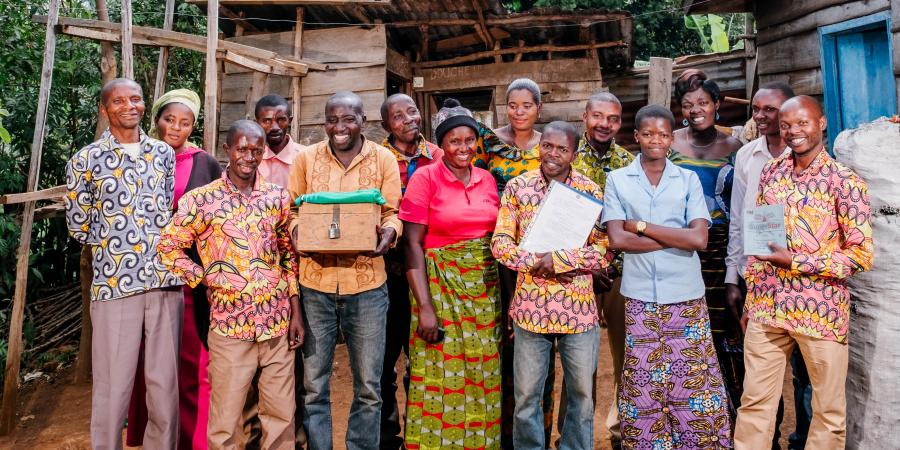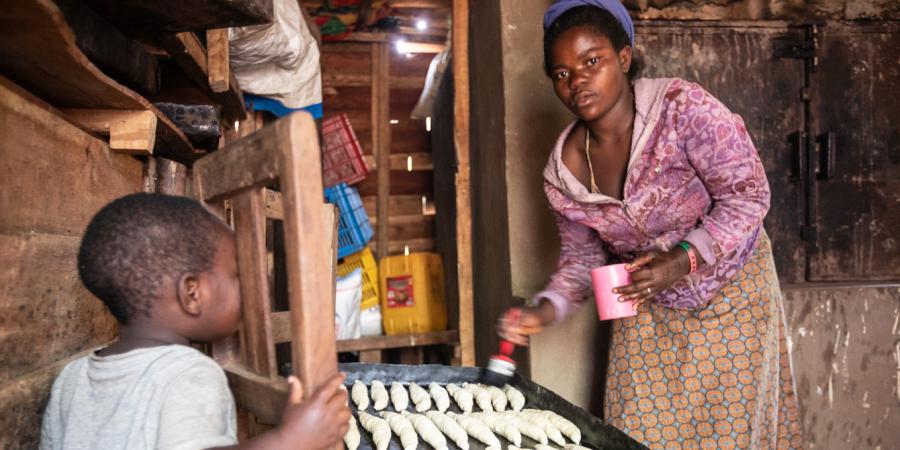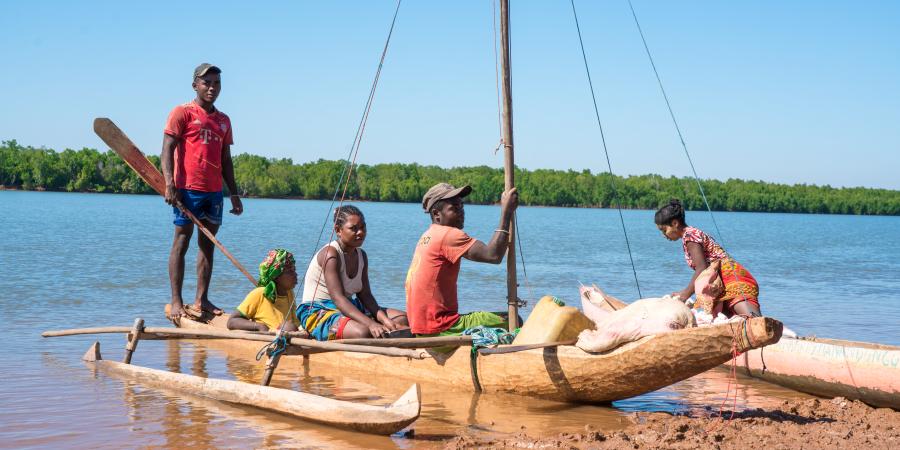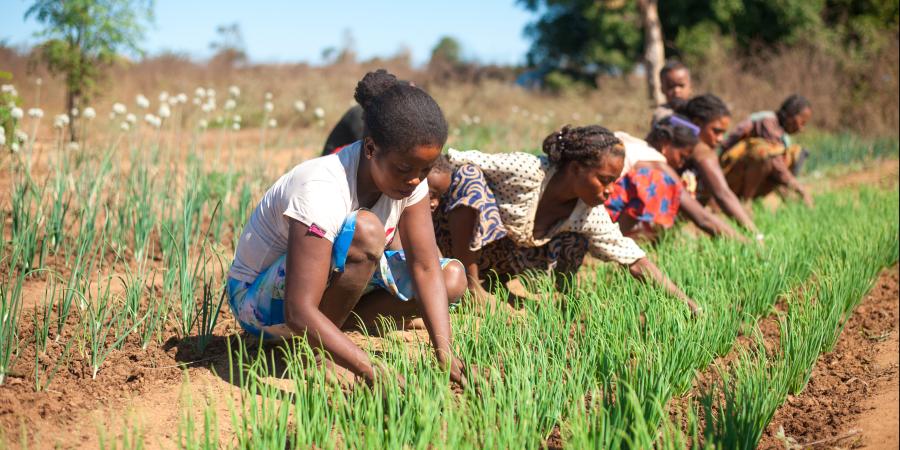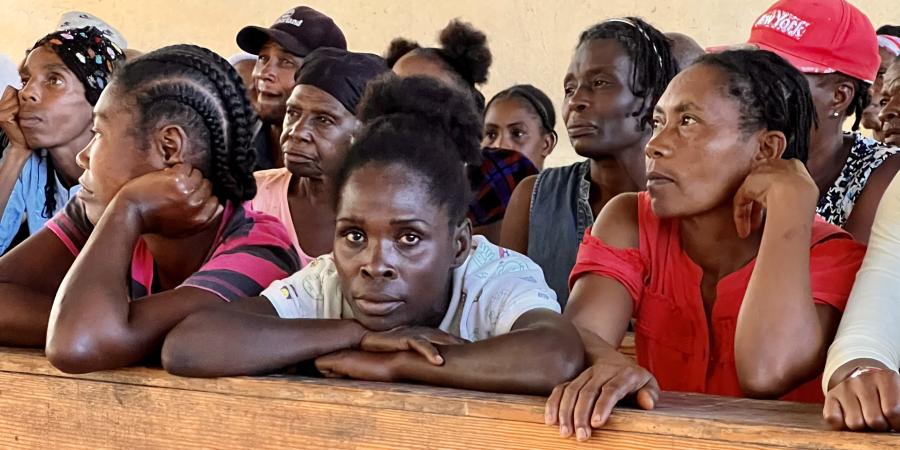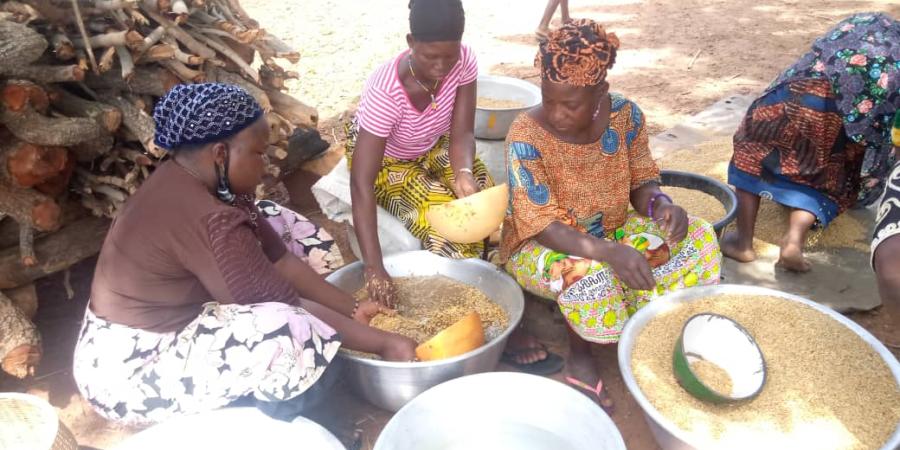

Entrepreneurial Systems
Developing inclusive entrepreneurial systems
Louvain Coopération supports the development of dynamic entrepreneurial systems to promote economic independence, socio-professional integration and access to decent work, particularly for young people and women.
These systems bring together a range of actors (businesses, financial institutions, universities, support organisations) and processes that interact to strengthen entrepreneurial momentum and reinforce local economic ecosystems.
The objective: to create conditions conducive to growth, competitiveness and sustainable job creation for communities.
Entrepreneurship, literacy, and socio-professional integration
The development of inclusive entrepreneurial systems requires taking into account a whole range of factors, activities and actors. Our work focuses on several of these factors:
- Entrepreneurship
- Socio-professional integration
- Functional and awareness-raising literacy
- Structuring and support for local cooperatives
- Circular economy
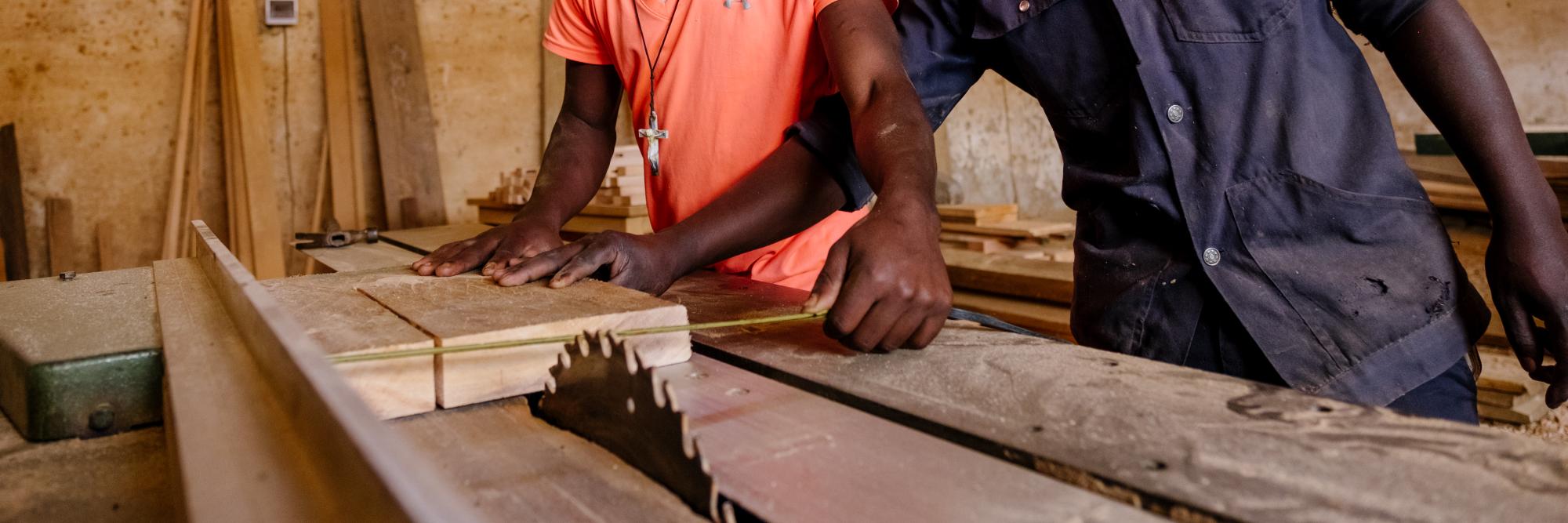
RDC
Support and reintegration of children and young people living on the streets
Four different projects are currently aimed at supporting and reintegrating street children and young people in Kinshasa. These are the “Street Children Project”, funded by Belgian Cooperation, “Tremplin”, funded by Enabel, the Belgian development agency, “Elenge na Mosala”, funded by the Brussels-Capital Region, and finally the “Learning Pathway”, funded by the King Baudouin Foundation.
- Project duration: 2022 - 2026
Our objective:
To promote the empowerment, socio-professional reintegration and dignity of young people living on the streets of Kinshasa by offering them a learning, training and support programme tailored to their needs.
Our actions:
- Reception and support for young people living on the streets, more than half of whom are girls;
- Vocational training in informal trades (cooking, beauty, cutting and sewing, electricity, mechanics, etc.)
- Practical internships with master craftsmen in the informal sector;
- Additional training in digital marketing, soft skills (behavioural and social skills) and entrepreneurship;
- Distribution of integration kits containing useful tools to help young people who have demonstrated strong motivation and empowerment skills to start their own businesses;
- Development of an inclusive approach promoting girls' access to traditionally male-dominated trades;
- Integration of a research component with UNIKIN (University of Kinshasa) to analyse integration pathways;
- Capacity building for teams at partner centres (psychosocial support, career guidance, integration).
Our Impact:
These projects offer a concrete alternative to exclusion for particularly vulnerable young people. They provide them with useful skills, recognise their potential and reconnect them with their economic and social environment. In this way, they help to build dignified and sustainable life paths.

RDC
Creative spark: supporting socio-cultural projects
- Project duration: 2025–2027
Our objective
To support, strengthen and promote cultural and creative initiatives led by local young people, by supporting emerging artistic careers and innovative projects with a strong social impact.
Our actions
- Ensuring the organisation, support and monitoring of socio-cultural projects carried out by youth associations.
- Personalised support (mentoring, workshops, training) from professional coaches in the cultural or sports sector who respond to their needs and interests;
- Networking and exchanges with other young people and professionals in the cultural or sports sector;
- The possibility of receiving financial support for project development (maximum duration 6 months);
Our impact
Through personalised support from professional coaches in the cultural or sports sector, this project enables young professionals in the DRC to strengthen their skills in the cultural sector and creative economy, thereby promoting a lasting impact on their development and social cohesion.
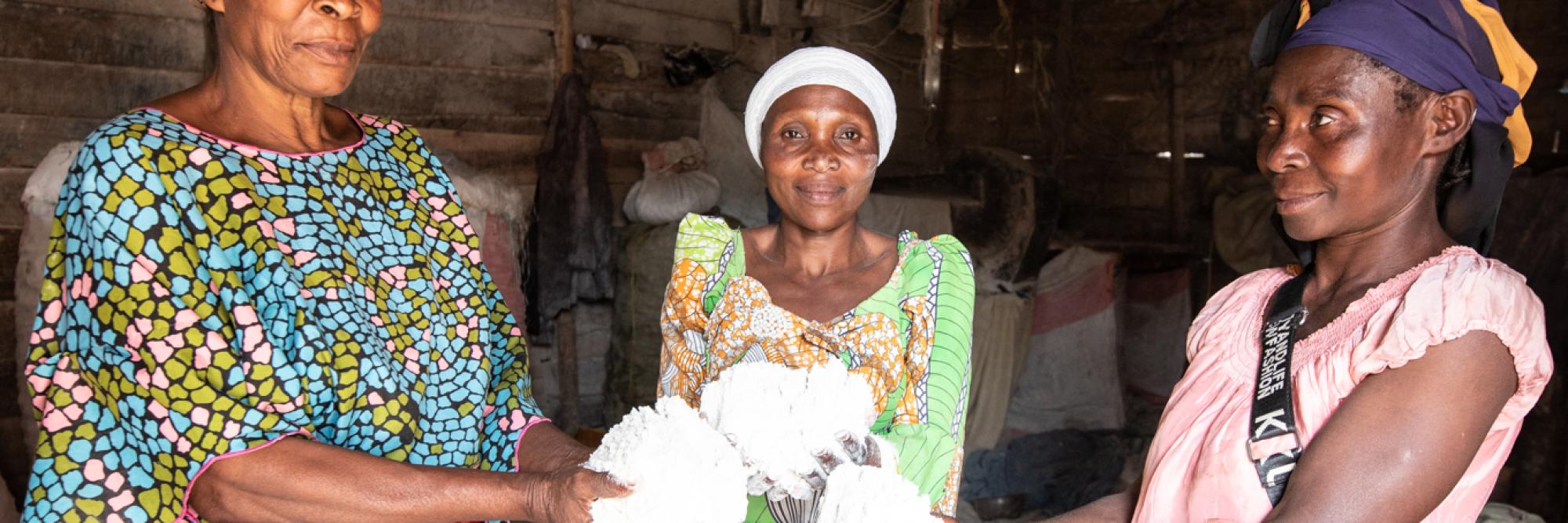
RDC
Ensemble pour elles
- Project duration: 2025
Our objective:
To improve entrepreneurial skills, profitability and job creation for women entrepreneurs in the Bukavu region (South Kivu) while promoting their social inclusion and resilience in a challenging context.
Our actions:
- Support for 100 women entrepreneurs active in:
- Basic food trade
- Agri-processing
- Crafts
- Transport
- Local services
- Training in entrepreneurship, administration, finance, HR management and digital marketing
- Organisational diagnostics incorporating gender analysis
- Awareness-raising on the legal framework, the environment, gender and climate change
- Integration of the OIE (Environmental Integration Tool) approach to strengthen the positive ecological impact of businesses
- Creation of a Safe Space in Bukavu including:
- A training area
- A psychosocial support space
- A childcare centre
- Emergency and comfort equipment
- Construction of the ‘Pour Elles’ house with our local partner, the Guichet Économie Locale du Sud-Kivu (South Kivu Local Economy Office)
- Establishment of mobile training teams, mainly composed of women
- Organisation of discussion forums and awareness-raising activities on:
- Gender stereotypes
- The fight against gender-based violence
- Positive masculinity
- Social norms and women's rights
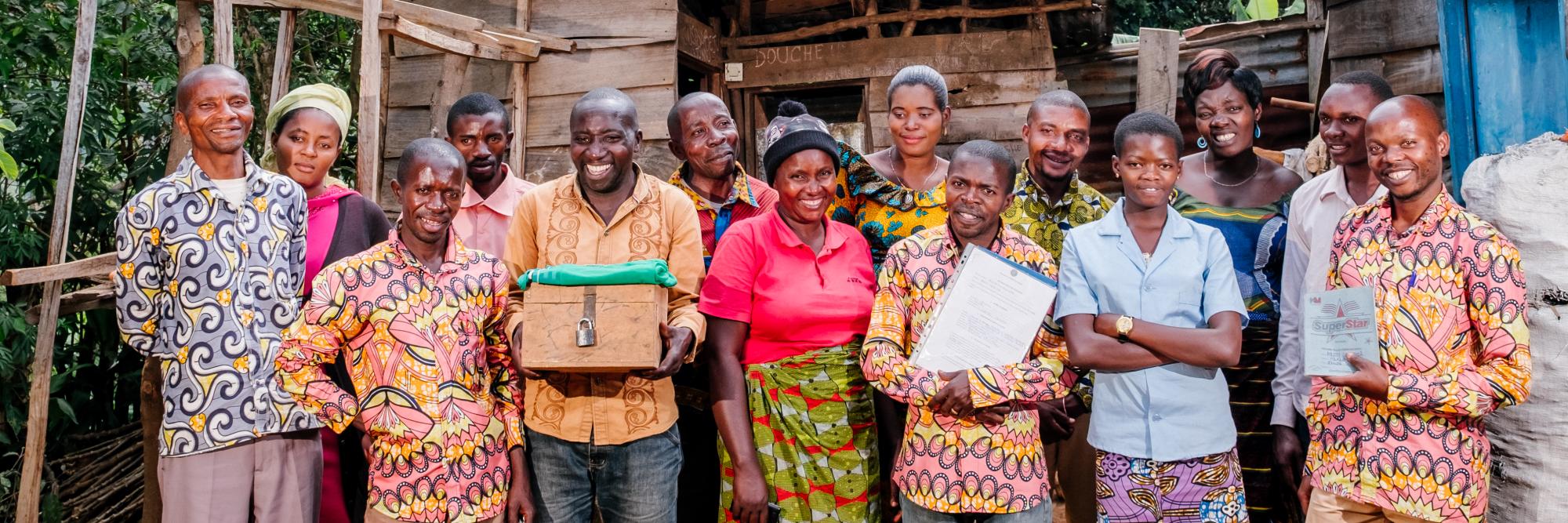
RDC
Facilitating local initiatives in the DRC
- Project duration: 2023-2026
Our objective:
To strengthen the capacities of civil society organisations (CSOs) in the DRC to promote a more inclusive and participatory democratic space. The project supports initiatives in the areas of governance, human development and sustainable development.
Our actions
- Establishment of the Local Initiative Support Service (SAIL), a resource centre for CSOs in the 26 provinces of the DRC;
- Training and support for 120 microprojects across the country;
- Funding for local microprojects up to €60,000 for a maximum duration of 12 months each;
- Support for concrete initiatives on a variety of themes:
- Peacebuilding (Western Kasai)
- Literacy and integration of young people (Kinshasa)
- Care for street children (Kinshasa)
- Detection of complications related to sickle cell anaemia (Kinshasa)
- Cultural promotion: jazz and piano festivals (Kinshasa)
- Expansion of hospital maternity wards (Kisenso)
- Economic resilience of women in mining areas (Ituri)
- Agribusiness for young people (Central Kongo)
- Food security and access to water (Kwilu)
- Urban sanitation and environmental education (Kinshasa)
- Youth engagement on climate change (North Kivu)
- Participatory land governance (South Kivu)
Our Impact:
This project helps to revitalise Congolese civil society in all provinces by promoting local initiatives. It strengthens participatory governance, improves access to fundamental rights and gives a voice to grassroots actors, particularly young people and women.
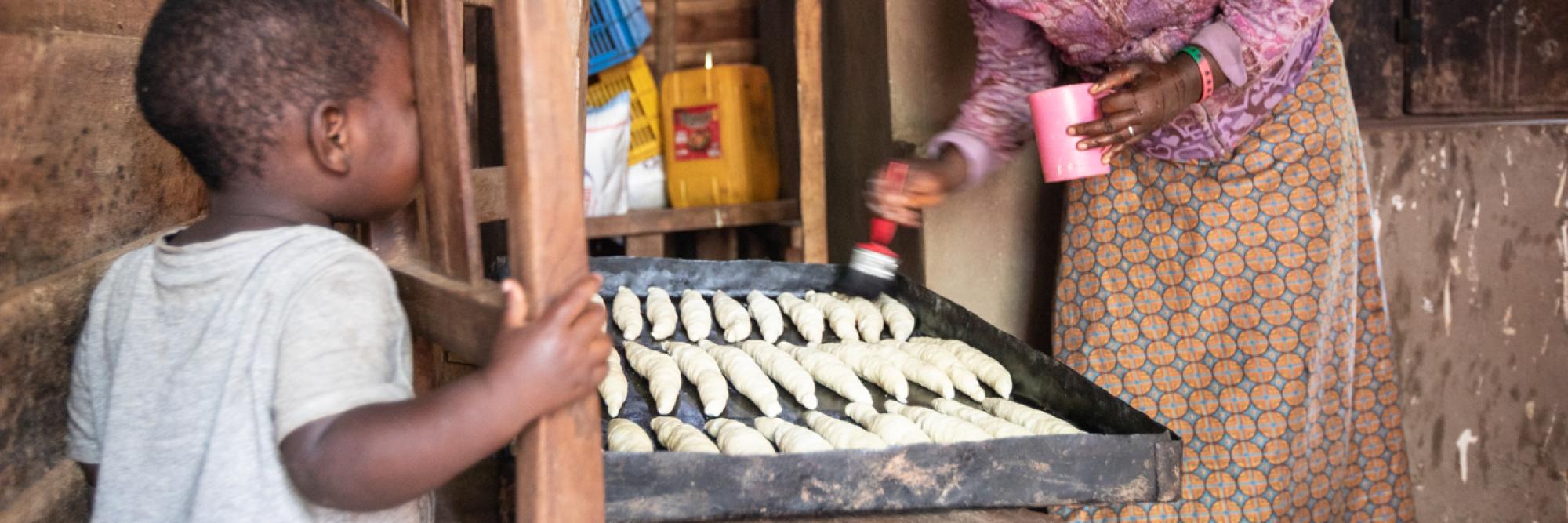
RDC
Observatory for Women
Our objective
To contribute to the economic empowerment of women and thus help reduce gender inequality by supporting women-led entrepreneurial initiatives.
Our actions
- Organisation of round tables and discussion groups on female entrepreneurship;
- Strategic support for structuring the Observatory's economic model and seeking funding and strategic partnerships;
- Completion of postdoctoral work on one of the issues identified as a priority;
- Centralisation of research and action research, relevant activity reports, and grey literature on female entrepreneurship in the DRC;
- Supporting dissertations written by pairs of Congolese, Belgian and French students, in partnership with Belgian and French universities and colleges;
- Support for internships within the Observatory;
- Production of digital content based on research findings;
- Awarding of the Observatory's Prize for Research on Sustainable Female Entrepreneurship For Them to the best research carried out by a student from a Congolese university.
Our impact
This project capitalises on the experience of women entrepreneurs and the lessons learned from programmes on women's economic empowerment, combining them with scientific research and incorporating an approach that takes environmental, social and climate aspects into account.
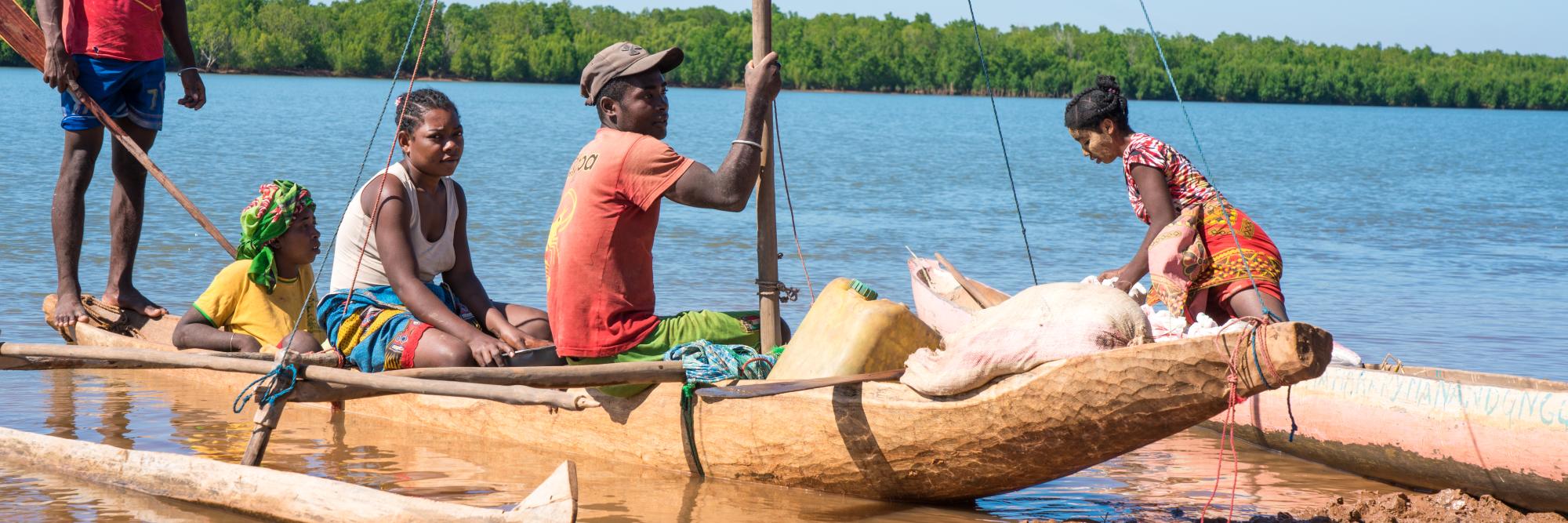
Madagascar
Promoting inclusive fishing in the mangroves of Menabe
- Project duration: 2022–2026
Our Objective
To ensure the sustainability of fishing areas located in the mangroves of the Menabe region by preserving natural resources and meeting the socio-economic needs of local communities.
Our Actions
- Conducting in-depth studies on fishery resources, including field surveys and catch monitoring to understand exploitation dynamics and species diversity;
- Collecting and analysing data to inform local policies and strengthen sustainable management of fishing areas;
- Promoting inclusive fisheries resource management, involving local communities in decision-making and governance;
- Identifying and supporting alternative economic activities (beekeeping, market gardening, etc.) to reduce pressure on mangrove ecosystems;
- Strengthening the protection of mangrove ecosystems through strategies adapted to the socio-economic realities of fishermen and the families who depend on them.
Our Impact
This project contributes to a better understanding of fishery resources and enables the development of more sustainable and inclusive fishing practices. It supports the diversification of local communities' livelihoods and promotes the long-term preservation of mangrove ecosystems, which are essential for the region's biodiversity and climate resilience.
Burundi
Support for the Promotion of Agricultural and Handicraft Products
- Project name: PROVAPA-TERIMBERE
- Project duration: 2022 - 2027
Our objective:
To promote agricultural and artisanal products in the provinces of Makamba and Rutana by supporting 70 agricultural organisations (1,400 households) in the maize, cassava and banana sectors.
Our actions:
- Actions across the entire agricultural value chain and support for the various actors in the chain.
- Technical training to strengthen skills in agricultural and non-agricultural professions.
- Entrepreneurial training aimed at developing business plans, management tools, access to credit and personalised support.
- Training for producers in sustainable agricultural techniques adapted to the local context.
- Support for local production of seeds and agricultural equipment.
- Improvement of production through the introduction of quality seeds, crop diversification, or the integration of livestock farming into family farms.
- Processing of agricultural products through the establishment of small processing units to create value and reduce waste.
- Functional literacy focused on rural economic activities, particularly targeting women and marginalised groups to strengthen their autonomy and community integration.
Our impact:
This project contributes to developing more resilient agriculture that respects natural resources, while ensuring greater food security and developing the social and economic potential of the local population in an inclusive manner.
Discover our actions for inclusive entrepreneurial systems
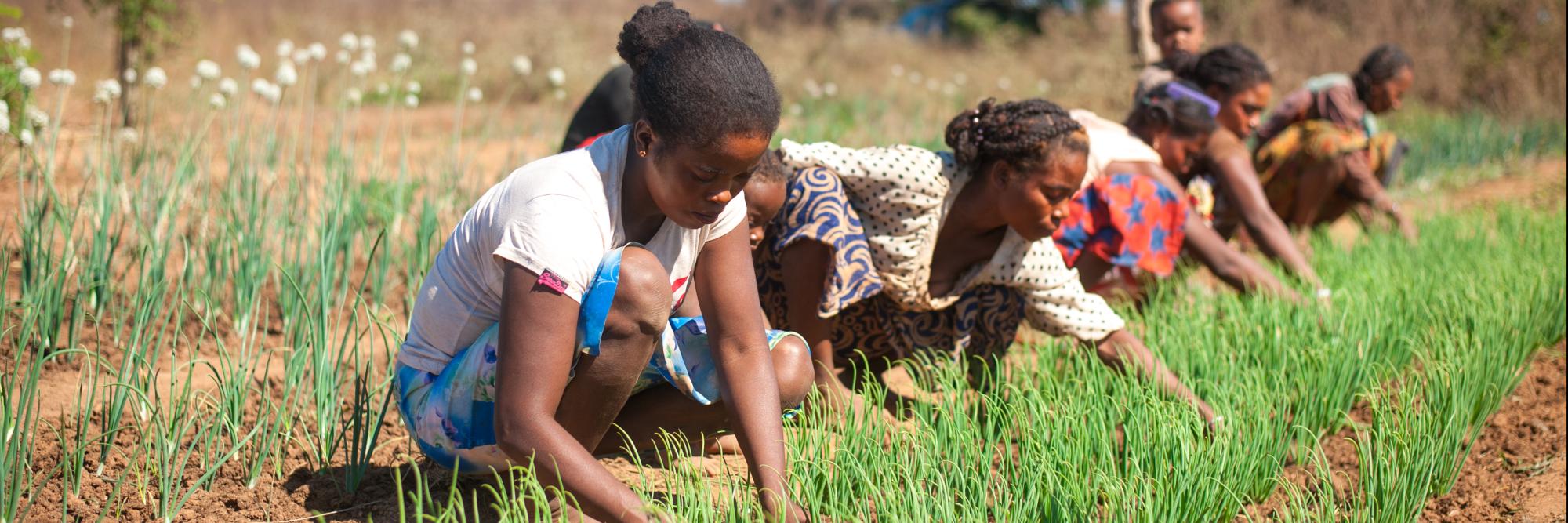
Madagascar
Socio-economic resilience of rural women in Menabe
- Project duration: 2022-2026
Our Objective
To strengthen the socio-economic resilience of 200 rural women who are members of Solidarity Savings Groups (GES) by developing their entrepreneurial and agricultural skills and their access to sustainable productive resources.
Our Actions:
- Strengthening governance and decision-making autonomy within 15 Solidarity Savings Groups
- Creation of a seed centre and an agricultural processing unit to improve access to modern agricultural resources
- Organisation of training courses in association governance, financial management and agroecological techniques
- Technical and logistical support for the production of quality seeds and the processing of agricultural products (peanuts, cassava)
- Networking of GES to promote exchanges, solidarity and the dissemination of good practices
Our Impact
This project improves the income and economic autonomy of rural women, strengthens local food security and contributes to the sustainability of agricultural structures through participatory and sustainable local management.
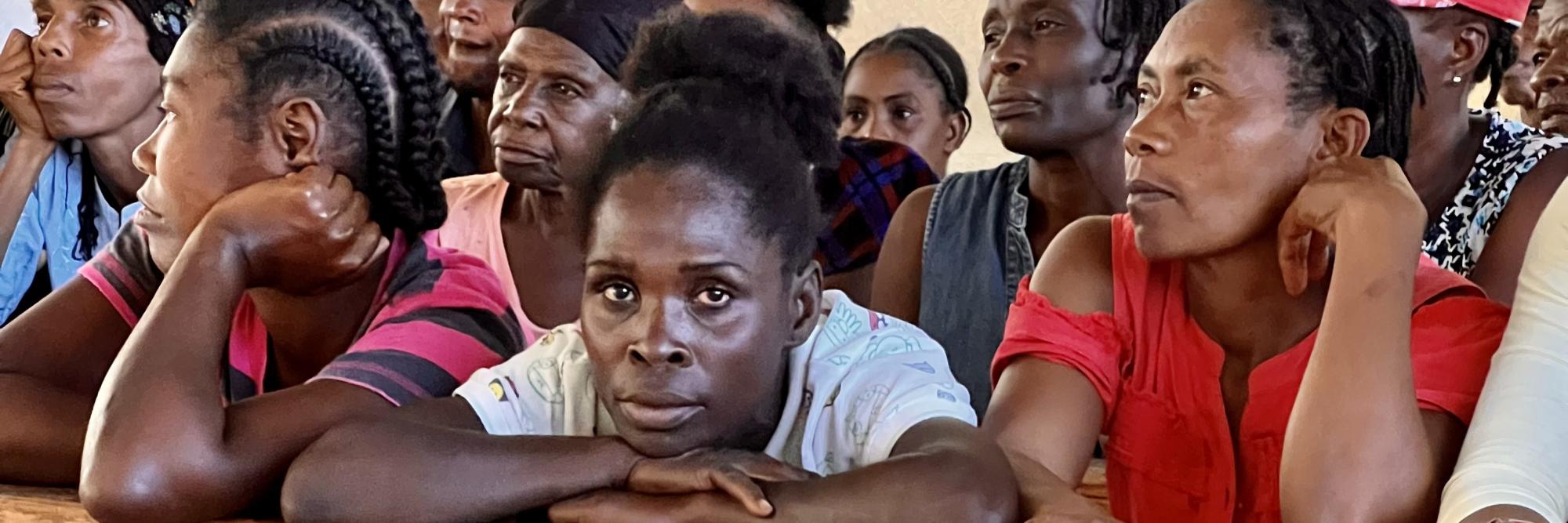
Haiti
Strengthening protection for children and women in Jacmel (south-east)
Our objective
Promote the emergence of supportive and committed communities in Jacmel, in south-eastern Haiti, in order to ensure the protection of children, equal rights and the empowerment of women, while involving young people and their families in the sustainable development and self-determination of their community.
Our actions
- Strengthening engaged communities: creating and supporting community round tables bringing together women's associations, farmers' organisations, traders, schools, religious and political leaders, etc.;
- Supporting active youth clubs in eight municipal districts of Jacmel to strengthen their civic participation and make their voices heard;
- Development and implementation of community action plans co-constructed by communities to promote access to fundamental rights (food, education, health);
- Prevention of risky situations: support for communities where street children and minors in conflict with the law come from.
- Social reintegration of vulnerable children and young people leaving detention, with psychosocial and educational support.
- Support for young single mothers through the integration of women's associations, awareness-raising on human rights and health, and training in project management.
- Awareness-raising and training on children's rights, gender equality, and environmental and climate issues.
- Strengthening local organisations to develop their skills and improve their ability to influence public policy.
- Networking between stakeholders to promote collaboration between associations, local institutions, state authorities, and international partners to maximise the impact of actions.
Our impact
This project strengthens the protection of children and women in Jacmel, develops community solidarity and promotes youth engagement, while supporting sustainable changes for better access to fundamental rights.
Burundi
Support for entrepreneurship in the agricultural sector
- Project name: SESA-UMWUMBATI WACU
- Project duration: 2023-2027
Our objective:
To support 9,265 micro, small and medium-sized enterprises working in the production, processing and marketing of agricultural products in the cassava sector.
Our actions:
- Production and provision of quality seeds through support for seed producers.
- Training in agroecological practices for producers, seed producers and 53 producer organisations.
- Integration of livestock farming into family farms to diversify production and facilitate access to natural fertilisers.
- Development of processing units to diversify processed products while making use of agricultural waste.
- Facilitating access to finance through banks and microfinance institutions for rural businesses.
- Functional literacy focused on rural economic activities, particularly for women and marginalised groups to strengthen their autonomy.
- Promoting human rights and decent work through awareness-raising and popular education initiatives.
- Educational activities on the environment and the green economy to encourage responsible and sustainable behaviour.
Our impact:
This project helps to sustainably strengthen the economic capacities of thousands of rural actors involved in the cassava sector, while promoting social inclusion and autonomy for the most vulnerable. Thanks to an integrated approach, it contributes to more resilient, equitable and environmentally friendly agriculture.
Benin
Sustainable agriculture and inclusive entrepreneurship
Our objective
These projects aim to strengthen the economic resilience of households and promote sustainable, equitable and inclusive food and agricultural systems. They support local producers, cooperatives and entrepreneurs through a two-pronged approach: agroecological transition and the development of sustainable, income-generating economic activities.
Our actions
Sustainable agriculture and food systems
- Promote agroecology for agriculture that respects natural resources and is socially equitable.
- Train farmers in sustainable agricultural techniques, farm management and production development.
- Support access to agricultural equipment (processing, storage) and improve access to rural finance and markets.
- Assess and monitor the economic, social and environmental performance of farms.
Local entrepreneurship and cooperative structuring
- Strengthen the entrepreneurial spirit and technical and management skills of economic project leaders.
- Offer tailored non-financial advisory and entrepreneurial support services.
- Structure and support the governance of cooperatives, particularly in the processing and marketing of agricultural products.
- Facilitate public-private exchanges and entrepreneurs' access to markets and financing.
Focus on inclusion and gender
- Promote sustainable entrepreneurship as a lever for social development for women.
- Integrate functional literacy and a rights-based approach into support programmes.
- Encourage the active participation of women in economic decision-making and cooperative governance.
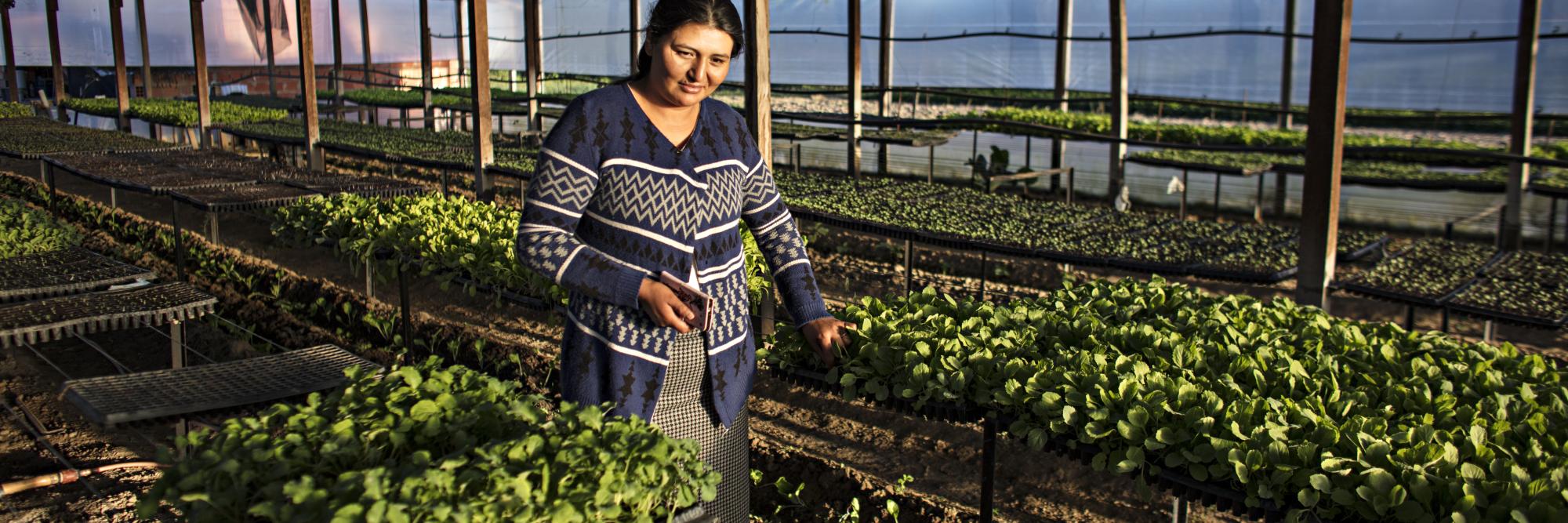
Bolivie
Our objective
To improve the economic fabric and employment in the Tarija region, in particular by improving the employability of young people and women.
Our actions
- Training and awareness-raising among public and private institutions to integrate the principles of circular economy and environmental sustainability into their management tools.
- Developing technical skills and employability among young people to improve their access to job opportunities or income-generating initiatives.
- Stimulating entrepreneurship and self-employment by supporting the creation of sustainable and profitable agricultural and non-agricultural micro-enterprises run by young people.
Our impact
This project promotes a more inclusive and sustainable local economy in the Tarija region, where young people are becoming key players in economic and social development. It strengthens women's participation, promotes gender equality and encourages environmentally friendly economic practices, thereby contributing to a better quality of life for rural and peri-urban communities.
Our specific role
Louvain Coopération supports its partner, the NGO Esperanza Bolivia, which is leading the implementation of the project, by providing its expertise in social and solidarity economy, gender and environmental sustainability. In particular, we are helping to set up research on more specific issues and carry out analyses on different aspects of employment in Tarija.
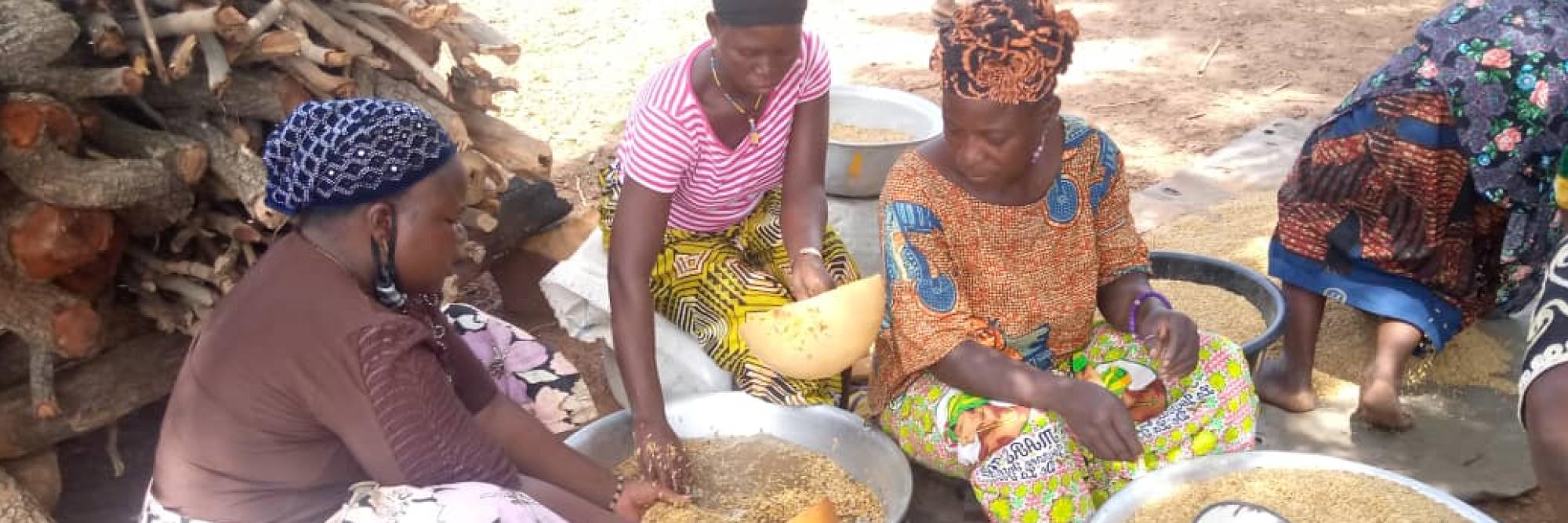
Togo
Transition to sustainable and inclusive food systems
- Project duration : 2022-2026
Our objective:
To support agricultural entrepreneurs and rural communities in the Savanes Region in their transition to sustainable food systems. This involves strengthening their individual and collective capacities to enable them to fully exercise their economic, social, cultural and environmental rights, while integrating gender equality at the heart of every action.
Our actions
- Training for agricultural entrepreneurs and producers to strengthen technical skills and promote sustainable farm management;
- Practical workshops on innovative marketing and food hygiene;
- Integration of livestock farming into agriculture;
- Deployment and strengthening of the Participatory Guarantee System (PGS) for the certification of locally produced agroecological products;
- Creation of an online platform, EcoAgriMarket, for the sale of local agroecological products;
- Assessment and support for the agroecological transition of around 100 farms;
- Implementation of a literacy programme using the Reflect method (Regenerated Freirean Literacy through Community Techniques) comprising eight literacy centres, mainly for women;
- Facilitation of community reading, writing and listening clubs.
Our impact
This project enables agricultural producers and entrepreneurs to strengthen their skills, increase their incomes and better promote their products, while promoting the economic inclusion of women and the resilience of rural communities.

